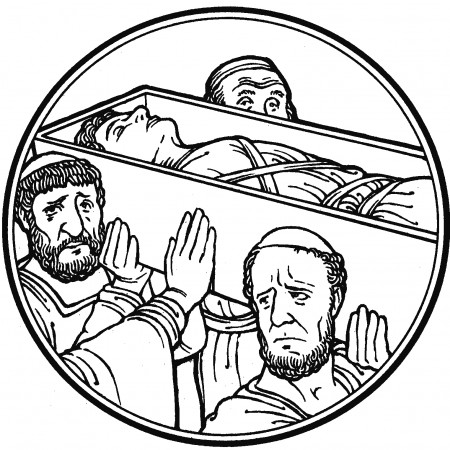The Sixteenth Sunday after Trinity
Luke 7:11–17
+ IN NOMINE IESU +
Two great processions meet at the gate of Nain: one of death and one of life. Which of them will prevail: The boy by sin’s wages slain or the Prince of Life Himself?
We know the answer. But knowledge does not always comfort when thoughts and feelings come to bear as we ponder those loved AND lost.
Luke expressed this feeling well. He gives words to how it feels in the moment. It doesn’t come out as well in English and it does in the Greek.
AND Jesus drew near to the gate
AND, behold, a man who had died was begin carried out
AND, he was the only son of his mother
AND, she was a widow
AND, a considerable crowd was with her.
The ANDs just keep piling up, one after another. The shear weight is felt with each one. They beat us down AND keep us down. When it rains, it pours, we think. What else is coming? What more can happen? Can’t she catch a break?
It feels like it will never stop. That the procession of death to the grave will simply keep on going, relentlessly AND ruthlessly barreling through our lives like a tornado, with speed and without direction, taking with it anything that steps in it’s path.
Death is the common lot of mankind. AND no one escapes. AND worse than that is not that we die, but that our loved ones die. And leave us behind. AND there is nothing we can do about it.
BUT Jesus does. He has compassion. His heart bursts within His chest for the mother, AND He stands in the way of the unyielding procession of death, between Nain and the cemetery, AND it stops dead in its tracks. AND Jesus reaches out and touches the bier. AND He speaks. First, to the mother: Stop weeping. AND then to the boy: Arise. AND they do. AND He gave the boy back to his mother.
It is the compassion of the Lord that drives His command to the mother: “Stop weeping.” The present tense imperative is better translated “stop” than “don’t.” And in this scene it makes more sense. Her husband is dead and now her son is dead. She is weeping. The Lord’s gut aches within Him to behold the curse of Adam visited upon her and He commands it to stop. Why shouldn’t He? He has the authority to reverse death—not simply because He is Divine but because He is the Messiah who has taken on our flesh made mortal by sin and will submit to death as this boy’s substitute.
So He exercises His authority—the authority of the Substitute and Ransom. The Lord’s reaches out, His body touches the wood that carries the dead and makes alive. He commands the boy to rise. The boy sits up and speaks and Jesus gives him back to his mother.
This doesn’t mean we should not weep for dead husbands and sons. It means rather that the Lord came to put a stop to death. He stops the sorrow of death by dying in the boy’s place. He doesn’t need to wait for it to be accomplished in time. It’s already done. The promises of God are never simply a matter of the future. Rather the promises of God are so true and sure that they deliver in time from eternity. What they promise they also give. The Lord’s course has been set since He cursed the serpent in the garden and set Himself, the seed of Eve, as enmity between the author of death and Eve’s descendants. Thus death has the guarantee of what it is owed, of what justice demands, in the flesh of Adam joined to the substance of God and it has no right to hold its prey. “Get up,” the Lord says and death lets go, the boy sits up and speaks, alive.
No one will interrupt the tears of the Lord’s widow mother on her way to Rome’s gallows outside Jerusalem or tell her to stop weeping for her only-begotten. We can only imagine the sorrow of the sword that pierces her heart as they unjustly and cruelly not only torture her Son to death but continue to mock and lie about Him, when HIs body touches the wood of the cross, dies but in so doing, gives life to all those who believe.
But she will stop. She will stop weeping. She stops weeping when her Son rises from the dead and paves the way into Paradise for her and all believers in His death, resurrection, and ascension. The promise comes true and death lets go and the angels sing.
The Lord has not yet told us to stop weeping. Our dead have not been raised. Our tears still flow. But death is losing its grip. The angels holding back the destructive winds are eagerly waiting of the last Baptism. The choir is ready to sing. Our dead have preceded us to paradise but wait for their bodies and wait for us. Death is dying. It can’t have them. It can’t have us. It had Jesus instead, and like new wine in old wineskin He ruined it forevermore. They will rise. So will we. All the dead will rise and whether it is commanded explicitly or not, we will stop weeping. We will follow Jesus out of the grave and the Father’s side and join the holy angels in the holy song of praise.
Even now we sing. But not the song of Nain. We do not sin “A great proper has risen among us.” Rather our song is the song of the holy angels at the tomb: “Jesus of Nazareth who was crucified is risen form the dead.” Death makes the living silent and weep. But life out of the grave makes the dead rejoice and sing. For the body of the Lord now touches you, and gives life.



0 Comments